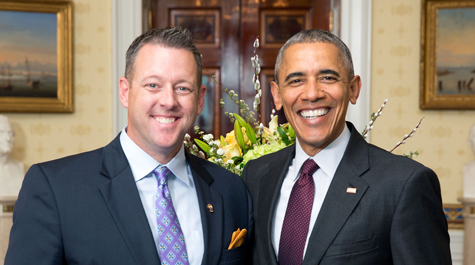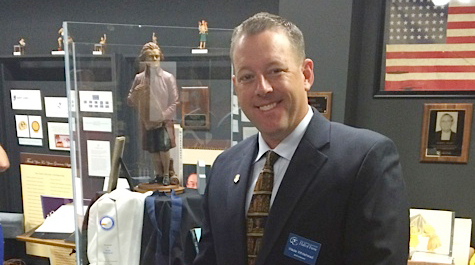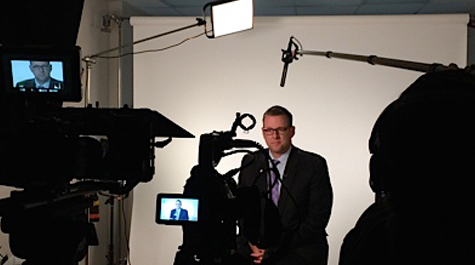Q&A with National Hall of Fame Teacher Wade Whitehead '94
This past summer, Wade Whitehead ’94, a fifth-grade teacher in Roanoke, was inducted into the National Teachers Hall of Fame. The honor is given to just five teachers each year and recognizes the most exceptional career teachers from across the nation. We sat down with Whitehead to discuss the award, his visit to the White House, and the current state of teaching in the U.S.
W&M: As one of five teachers inducted into the National Teachers Hall of Fame in 2016, you’ve been honored as one of the country’s very best teachers. How does it feel?
Whitehead: I am truly stunned and humbled by the honor. I am lucky to know many excellent classroom teachers across America and had a number of exceptional teachers during my own education, including during my four years at William & Mary. In many ways, my recognition is a reflection of their influence and hard work.
Over the past 25 years, the National Teachers Hall of Fame has honored 125 total inductees, including legendary teachers like California’s Jaime Escalante and 1994 inductee Renee O’Leary from Delaware, who, later this spring, will complete her 66th year of classroom teaching!
Primarily, though, this honor has reminded me of the power every classroom teacher holds to transform lives. As I said in my induction speech last June, “In our country, there is no textbook Hall of Fame. There is no Math standards Hall of Fame. There is no evaluation instrument Hall of Fame. Why not? Because these resources and, in fact, every other thing schools can control, utterly fail to compete with the oldest-fashioned variable of them all: a good, solid classroom teacher. Even the profiteers and standardistos, who successfully hijacked much of the education policy debate of the past fifteen years, would have to agree: as far as student learning goes, the only thing that matters is high-calibre human capital, in the form of an excellent classroom teacher.”
W&M: Tell us about your visit to the White House.
Whitehead: I was invited to the White House as a guest of President Obama’s on a Tuesday afternoon last spring. Everything about the visit—from the security protocol and the scale of the home to the hospitality extended by staff and the unbelievable opportunity to meet personally with the president—exceeded my expectations. For an hour or so, I was simply a guest in the home, with nearly unfettered access to the first and second floors. The day progressed, however, into a celebration of teaching and eventually culminated with the announcement of the National Teacher of the Year in the East Room.
The highlight for me, of course, was a private meeting with the president in the Blue Room. In the days leading up to my visit, I had asked my fifth graders to help me decide what exactly to say to the president. I knew that time would be precious and I didn’t want to be caught unprepared. After quite a discussion, my class and I decided that I should say something resembling “Mr. President, your job is incredibly complex and unpredictable. Most Americans think they know what you do every day, but I’m not sure we do. You’ve made a tremendous sacrifice to serve our country. On behalf of America, thank you.” During my visit, after being introduced by a Marine Corps officer, the president spoke to me first. “Mr. Whitehead,” he said, “your job is so incredibly complicated and difficult. Most people think they know what teachers deal with every day, but I don’t think we really do. You’ve made sacrifices to stay in the classroom and I notice and appreciate that. On behalf of my family and America, thank you.” I will never forget that moment—or the invigorating conversation that followed.
W&M: When and how did you decide to become a teacher?
Whitehead: I am a fourth generation Virginia public school teacher and a product of Virginia’s public schools. As a youngster, I spent countless summer days in my parents’ empty classrooms. I witnessed the “business end” of teaching as they worked at the kitchen table and on the living room floor in the evenings and on weekends. At an early age, I become curious about the mechanisms that drive teaching and that galvanize learning. By the time I was reaching a career decision point, I knew I wanted to dig into exactly how imagination, discovery, and sharing combine to produce new and meaningful understanding and knowledge.
William & Mary was the only college to which I applied. I spent my first two years on campus exploring all sorts of courses on all manner of subjects. My goal was to take at least one class in every building on campus and I nearly succeeded, missing only Rogers Hall (which, at that time, housed the Chemistry department). From the Wren Building all the way to Morton Hall, I encountered every imaginable teaching style and I spent as much time analyzing my professors’ instruction as I did the content I was actually supposed to be learning. I applied for and gained admission into the School of Education during my sophomore year and launched a very busy final two years, during which I navigated majors in Elementary Education and Anthropology. By the time I reached my final semester, during which I was student teaching, finishing an Anthropology thesis, taking a few final classes, singing with The Gentlemen of the College, and serving as an R.A. in Old Dominion, I was determined to take on the challenge of classroom work.
As my understanding of the learning process has grown over the decades, I have gained new appreciation for a great deal of visionary teaching that I experienced at the College. William & Mary professors have unrivaled command of their particular content areas; what stands out to me, though, is the ability so many of them had to communicate that knowledge and to challenge their students, including me, to figure our way through it. My interest in teaching and learning was cultivated across the William & Mary curriculum and I was, by the time I graduated, fascinated by excellent instruction.
W&M: How has 20 years in teaching been different than you’d imagined? How has the job changed over the years?
Whitehead: Honestly, teaching is far more difficult than I ever thought it would be. American public schools face unprecedented challenges and are held to historic standards for what students should know and can do. Classroom teachers bear primary responsibility for the success of the most diverse set of students our country has ever known.
In Virginia, there are more than 5,000 fewer public school classroom teachers than there were in 2010, while the number of students has grown. New technologies appear almost daily. Influences from families, communities, media, and the private sector have shifted fundamentally. There has never been a more challenging time to work as a classroom teacher than right now.
However, as I often tell new or aspiring teachers, the challenges of classroom teaching are exceeded by one thing: the rewards. Our best teachers work magic in their classrooms and have a habit of inspiring routine cognitive metamorphosis in their students. What hasn’t changed (and what won’t) is that classroom teachers are drivers of progress among our nation’s most prized resource: its children.
W&M: What does teaching success look like to you? What keeps you going?
Whitehead: There is no teaching success without learning success. On our best days, my students are moving, talking, singing, building, deconstructing, discussing, editing, figuring, listening, coding, mentoring, and pondering. They imagine, discover, and share. When my students succeed, I succeed.
My professional rocket fuel comes from a variety of sources. My wide network of friends and colleagues constantly inspires and challenges me to reconsider my own work and my place in the larger education sphere. My students challenge me, daily, to teach the way they learn. I strive to cultivate a highly academic environment where productive failure is embraced and where relationships are key. I love my friend and colleague Nate Bowling’s characterization of great teachers as “nerd farmers.” Nerd fertilizer, which includes great books, deep discussions, field trips, technology, and constant questioning, induces growth, both within my students and within their teacher.
W&M: What advice do you have for new teachers, or those considering a career in teaching?
Whitehead: I often speak to new and future teachers, especially through my work at the Teachers of Promise Foundation, which I established several years ago. Our largest initiative, the Teachers of Promise Institute, identifies and recognizes the best prospective teachers from across Virginia. To date, we have recognized more than 2,200 honorees, including dozens from from William & Mary. We connect master educators from all over the country with the next generation of great teachers in an environment of celebration, elevation, and activation that I believe the profession deserves.
It is important for all of us to understand that most new teachers are “No Child Left Behinders.” Their entire school experiences have been centered in assessment-based reform. Standardized testing is the kudzu of education; it is an invasive species that is stealing sunlight from critical native values and priorities. We must ensure that new teachers experience the best possible use of standards and assessments; otherwise, they may never realize their own professional potential.
I think new teachers have to be reminded, more than anything else and in spite of the swirl of mandates, regulations, curricula, standards, and pedagogy, that the most important variable in student success is the quality of the classroom teacher. I believe that public school classrooms are the last bastion of democracy in America. Every person is welcome. Every voice matters. Every mind is valued. Great teachers, almost exclusively, ensure a motivated and informed future electorate. Our best future teachers are motivated and excited by a very real sense of social justice. New teachers have to understand that our collective success literally depends on high-calibre human capital, in the form of excellent teachers in our schools.
W&M: What’s the most important thing we, the entire W&M School of Education community, can do to support teachers right now?
Whitehead: I think most of the William & Mary School of Education community is aware that the the story of “failing American public schools” is a false narrative. We know more than ever about teaching and learning and today’s teachers are engaging students with unprecedented expertise. Even through the most rigorous standards ever, academic achievement and graduation rates are at all-time highs. By and large, teachers in our public schools are doing exactly the work we are asking them to do. The W&M SOE community can help those in other fields understand that, by and large, teachers are succeeding at the complex work we are undertaking.
However, I would also challenge the W&M School of Education community to begin to compare and contrast the work we are asking teachers to do with the work we should be asking them to do. What are the optimal systems for teacher evaluation, for assessment of student progress, for physical layout of our school facilities, and for teaching training that will unearth and cultivate the skills, knowledge, and perspective necessary in today’s global community? What teaching methods, approaches, or philosophies reach students on individually meaningful levels, and what management and supervisory schemes best support them? Our best educators are ready to transform, on a massive scale, our goals for public education and our plan for reaching them. Innovation is at our fingertips—and is the status quo in our very best schools and classrooms.
I would also point out that our best educators don’t want another dollar to implement programs they don’t believe in. They simply desire—and deserve—autonomy. The support teachers need can manifest as simple liberty from the onerous blemish game that masquerades as “professional evaluation” on many campuses. Want our students to learn more? If so, then (1) find and develop the world’s best teachers and (2) let them work their magic.
Thanks to its unrivaled track record and a perpetual willingness to voyage bravely, the W&M School of Education community can, and should, forge a new path for what our schools can be. Anticipating this future, and preparing creatively for it, may be the biggest gift our community can give.


